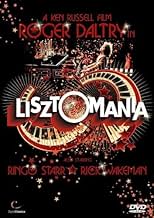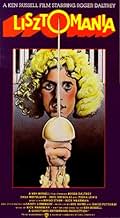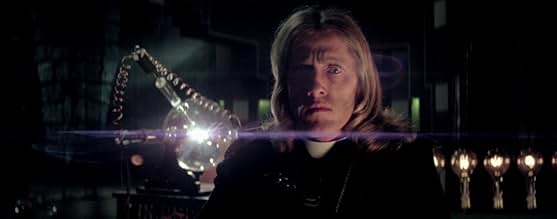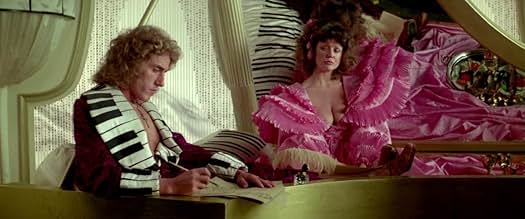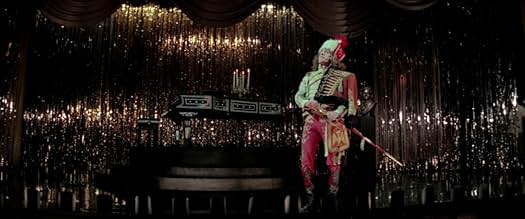IMDb RATING
6.1/10
3.3K
YOUR RATING
Composer and pianist Franz Liszt (Roger Daltrey) attempts to overcome his hedonistic life-style while repeatedly being drawn back into it by the many women in his life and fellow composer Ri... Read allComposer and pianist Franz Liszt (Roger Daltrey) attempts to overcome his hedonistic life-style while repeatedly being drawn back into it by the many women in his life and fellow composer Richard Wagner (Paul Nicholas).Composer and pianist Franz Liszt (Roger Daltrey) attempts to overcome his hedonistic life-style while repeatedly being drawn back into it by the many women in his life and fellow composer Richard Wagner (Paul Nicholas).
- Director
- Writer
- All cast & crew
- Production, box office & more at IMDbPro
Featured reviews
To many, this film is the stunning-proof that director Ken Russell never had it, and that idiocy and egotism were mistaken for genius. You could say mistaking idiocy and egotism for genius has been the appeal of rock music! Others might say that Russell is simply childish or immature, and that his films are the "masturbatory-fantasies" of an overgrown-adolescent. This belief is unfounded. Is this film over-indulgent? Yes it is, dear readers, very-much-so, because it is art, not entertainment. That-said, if you chuck any expectations, this is a funny film and allegory about the rise of pop-culture in the 19th Century. It draws parallels between Liszt's fame with the other generally-hollow spectacle known as "rock." This is great film-making, and it should be noted that it has similarities between itself and "Rocky Horror," and even "Hedwig and the Angry Inch," as they all examine and explore the relationships between sexuality and pop-culture in similar-areas. It really is true that women threw their underwear at Franz Liszt during his performances, and that he had many-many lovers--groupies.
Lisztomania is an odd bridge-between "classic" rock and the emergent punk-movement of the time. The film can also be seen as a statement that "rock" is not really subversive or rebellious at-all, but ultimately arch-conservative, and repressive. Amen. It's just a hilarious, wild-romp that will make your guests extremely nervous, which films should do. Movies should challenge people to think and reflect--at-least occasionally. Ironically (or maybe-not!), Mr. Russell had contracted Malcolm MacLaren and Vivienne Westwood to design the S&M-costumes for his film, "Mahler." It should also-be-noted that "Liszt-o-Mania" was released exactly the same year that MacLaren's shop "SEX" opened on King's Row, the rest is as they say, is history. It couldn't be more camp, it has Little Nell in it.
Basically-put, this is about the the ins-and-outs of "why" we want and need pop-culture, and WHAT we generally-want from our "pop-idols" (sex, of-course). One could easily-say this film criticizes the absurd spectacle that rock had become by 1975, and we get this quite-often in the film. But this theme goes much-deeper, into the relationship-between artist and patron (once, just the aristocracy, now the mob is added). The sexuality is about mass-psychology, too, so Wilhelm Reich gets-his-due, and there is a plethora of Freudian-imagery. It is certainly a very-personal film for Russell, and probably amuses him as much as it does myself that it enrages so-many critics, but it should be noted that some of the absurdity and excess came from the producer of the film, not Mr. Russell. Ken Rusell enrages all the right-people, and that's what some film-making should be.
God love this lapsed-Catholic, and God love his ways. A flawed part of his canon, but very watchable and educational. As Russell began his career doing documentaries and impressionistic-films on composers for the BBC, it makes-sense that this is considered one of his most heretical-works. He complains about the opening country-song in his autobiography 'Altered States', and there were other aspects of the production he didn't want in the film. It's interesting to note that the 1980s was the period of his purest-work, due mainly to a three-picture-deal with Vestron. The 1970s were actually a very mixed-bag for him, as Lisztomania attests. He isn't entirely-pleased with it, but had some fun with the material, and there it is. I think it's a hoot, which means it isn't on DVD.
Lisztomania is an odd bridge-between "classic" rock and the emergent punk-movement of the time. The film can also be seen as a statement that "rock" is not really subversive or rebellious at-all, but ultimately arch-conservative, and repressive. Amen. It's just a hilarious, wild-romp that will make your guests extremely nervous, which films should do. Movies should challenge people to think and reflect--at-least occasionally. Ironically (or maybe-not!), Mr. Russell had contracted Malcolm MacLaren and Vivienne Westwood to design the S&M-costumes for his film, "Mahler." It should also-be-noted that "Liszt-o-Mania" was released exactly the same year that MacLaren's shop "SEX" opened on King's Row, the rest is as they say, is history. It couldn't be more camp, it has Little Nell in it.
Basically-put, this is about the the ins-and-outs of "why" we want and need pop-culture, and WHAT we generally-want from our "pop-idols" (sex, of-course). One could easily-say this film criticizes the absurd spectacle that rock had become by 1975, and we get this quite-often in the film. But this theme goes much-deeper, into the relationship-between artist and patron (once, just the aristocracy, now the mob is added). The sexuality is about mass-psychology, too, so Wilhelm Reich gets-his-due, and there is a plethora of Freudian-imagery. It is certainly a very-personal film for Russell, and probably amuses him as much as it does myself that it enrages so-many critics, but it should be noted that some of the absurdity and excess came from the producer of the film, not Mr. Russell. Ken Rusell enrages all the right-people, and that's what some film-making should be.
God love this lapsed-Catholic, and God love his ways. A flawed part of his canon, but very watchable and educational. As Russell began his career doing documentaries and impressionistic-films on composers for the BBC, it makes-sense that this is considered one of his most heretical-works. He complains about the opening country-song in his autobiography 'Altered States', and there were other aspects of the production he didn't want in the film. It's interesting to note that the 1980s was the period of his purest-work, due mainly to a three-picture-deal with Vestron. The 1970s were actually a very mixed-bag for him, as Lisztomania attests. He isn't entirely-pleased with it, but had some fun with the material, and there it is. I think it's a hoot, which means it isn't on DVD.
The film suffers from atrocious vulgarization in very bad style and taste throughout, which is a pity, because the idea is not bad at all. Liszt and Wagner are portrayed in gross caricature, which they were already while they were alive and kicking, and just like the 19th century caricatures even these modern ones do not miss their target and actually pinpoint some obvious truths about these the greatest divas among composers in monstrous vanity and atrocious hubris. Liszt was the more sympathetic and actually fell a prey and victim to the ruthlessness of Wagner ending up as a trophy in his graveyard, while the depicting of Wagner as a vampire and prelude to Hitler, his Frankenstein monster, is not altogether maladroit. In certain aspects it actually hits the nail. The unnecessary hooliganism of the film is the corruption of the music, which really is very little Liszt and Wagner but the more Rick Wakeman in horrible disfigurement in pop and rock versions. This is not a music film or any kind of biography or documentation of great composers but rather a twisted parasitic phantasmagoria tearing classical music apart and more or less destroying it. Ringo Starr as a pope with Liverpool accent doesn't make things any better. It isn't even funny but only stupid and disgusting. although a few laughs must out. Still, because of the idea, the imagination, the great camera work and the brilliant fireworks entertainment, I have to give it 5, which is the lowest I ever rated a film here, and I am very doubtful whether I will see any other of Ken Russell's films on music, no matter how much I appreciated his "Valentino".
As a collector of Who memorabilia, I found this movie to be quite interesting and entertaining, what's more, if one pays attention they can see that this truly is the work of Ken Russell. Though it could also fit into the category of "soft porn" and is in no way to be taken as strict fact of Franz Liszt's life it is a great movie for those who like the bizarre (Who fan's will note cameo appearance by Townshend) If you like this movie, check out Ken Russell's Mahler, starring Robert Powell (Capt. Walker in Tommy) thank you
If you thought Tommy was a trip, wait til you get a load of Lisztomania. Think about hitting the 'shrooms beforehand. Trust me.
Other reviewers have described various scenes so I won't bother. It's marginally softcore p-rn, marginally softcore horror, and completely over the top. I wouldn't be sitting down the whole family to watch this one.
I enjoyed Roger Daltrey's gusto in the lead role, Ringo as the Orthodox Pope and Pete Townshend (and Elvis) represented in Orthodox iconography. There also appeared to be a lot of money spent on sets and costumes.
On one hand it would be easy to be offended by a lot of things in this movie: the desecration of the musical legacies of Liszt and Wagner, the abundant use of phallic symbols, the terrible soundtrack, asking us to believe Daltrey is a piano player, etc.
On the other hand, if you just surrender yourself to the absurdity of it, it's a bit of wacky fun for 90 minutes. Don't take it too seriously and it won't hurt you.
Other reviewers have described various scenes so I won't bother. It's marginally softcore p-rn, marginally softcore horror, and completely over the top. I wouldn't be sitting down the whole family to watch this one.
I enjoyed Roger Daltrey's gusto in the lead role, Ringo as the Orthodox Pope and Pete Townshend (and Elvis) represented in Orthodox iconography. There also appeared to be a lot of money spent on sets and costumes.
On one hand it would be easy to be offended by a lot of things in this movie: the desecration of the musical legacies of Liszt and Wagner, the abundant use of phallic symbols, the terrible soundtrack, asking us to believe Daltrey is a piano player, etc.
On the other hand, if you just surrender yourself to the absurdity of it, it's a bit of wacky fun for 90 minutes. Don't take it too seriously and it won't hurt you.
19th century castration fantasy--delineating the extravagance of Hungarian composer Franz Liszt's sex-saturated young life until his eventual death by the symbolic stabbing of a voodoo needle (a myriad of maladies in actual life)--done-up in the spirit of a naughty British schoolboy bored by his classical lessons and entertaining himself by looking up his music teacher's skirts. Writer-director Ken Russell's cartoon-strip nightmare begins promisingly, with a hilarious slapstick joust between Liszt and his lover's husband, the Count d'Agoult (it's a naked swashbuckler, like something from an inventive blue movie). But soon it becomes apparent that Russell's vision is going to be all a pastiche, from silent movies to "Frankenstein" to German Expressionism to bows of unassuming self-reverence. The surreality of Russell's concept doesn't even make sense in the mad forum he has created--there's a narrative thread, yet nothing hangs together--while the creative production design upstages most of the actors. *1/2 from ****
Did you know
- TriviaFirst movie to be encoded with a Dolby Stereo optical soundtrack.
- GoofsDuring the flashback when Liszt is notating the music for Dream of Love; on the second page in the first measure there is the note E-Flat written as an E with the flat symbol next to it. However, since the song is already in the key of A-Flat which includes E-Flat in the scale, it is not necessary to notate the Flat symbol next to the E note. This is only done if the previous E-note was notated as an E-Natural and even then the flat symbol would be placed in parenthesis.
- ConnectionsFeatured in Hollywood Singing & Dancing: A Musical History - 1970's (2009)
- SoundtracksRienzi/ Chopsticks Fantasia
Composed by Richard Wagner and Franz Liszt
- How long is Lisztomania?Powered by Alexa
Details
- Release date
- Country of origin
- Language
- Also known as
- Lisztomanía
- Filming locations
- New Wimbledon Theatre, The Broadway, Wimbledon, London, England, UK(Theatre interiors)
- Production companies
- See more company credits at IMDbPro
- Runtime
- 1h 43m(103 min)
- Sound mix
- Aspect ratio
- 2.35 : 1
Contribute to this page
Suggest an edit or add missing content


